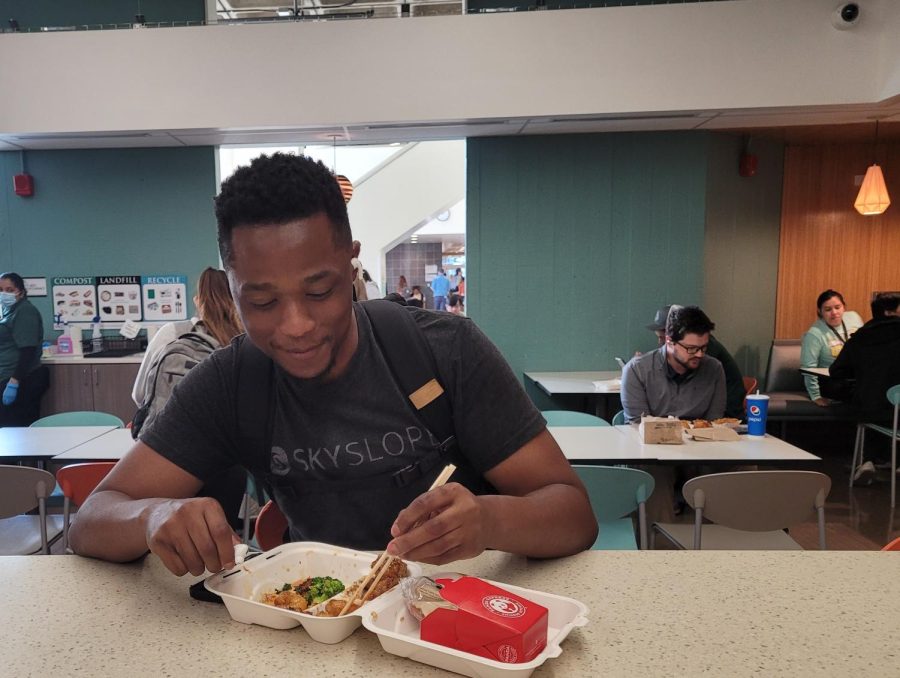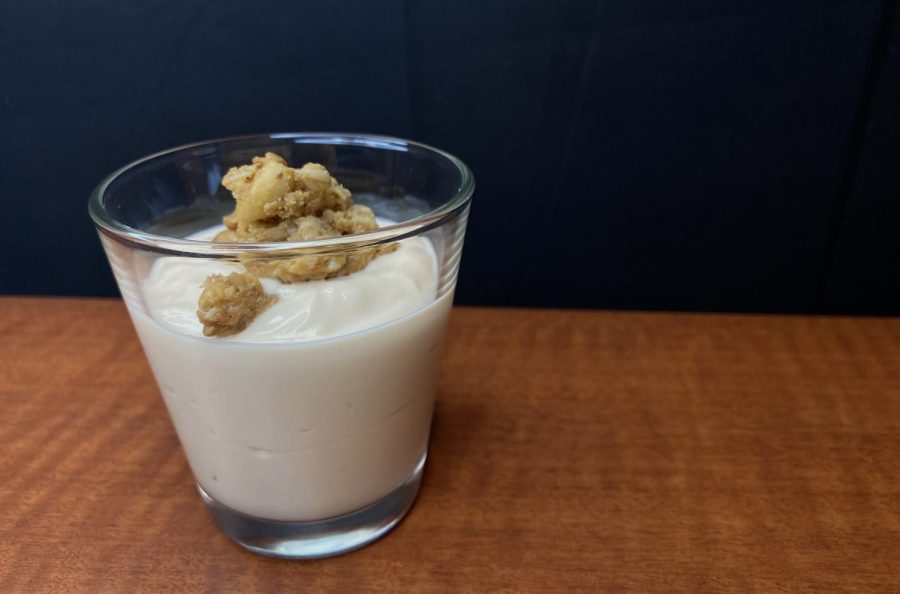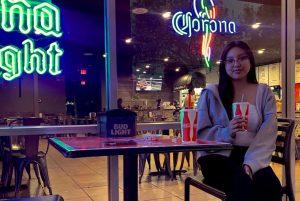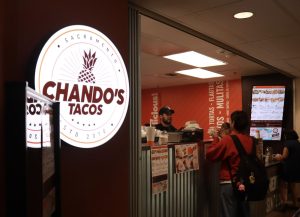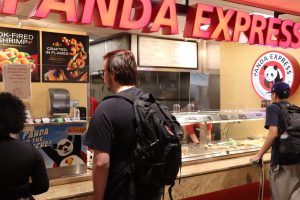Fuel for the brain: The struggle with nutritional health
What students can eat to be ready to take their exams
Third-year computer science major Evan Cammack eats food from Panda Express in The University Union on Tuesday, Oct. 25, 2022. Many students eat unhealthy foods while studying for exams on campus.
October 27, 2022
Sac State students study in preparation for exams throughout the school year; however, students run the risk of neglecting their nutritional health in an effort to maintain their grades
The issue with stress eating
It can be difficult for students who study on-campus to be healthy because many Sac State restaurants serve food that is low in nutritional value.
Nutrition and food Professor Jeannie Gazzaniga-Moloo said that a major issue students face when studying is stress eating, which involves binging on unhealthy foods.
Some students like fourth-year kinesiology major Lia Ross use unhealthy food to uplift their mood. Ross said that lately, she’s been eating a lot of Terra veggie crisps and hot fries.
“I usually go to In-N-Out,” Ross said. “I think that’s a feel-good food. I went yesterday because I was just over an exam.”
Fourth-year child development major Juliet Sarullo also catches herself stress eating. She said her favorite snacks during midterms include crunchy foods like Cheez-its, Goldfish and sweets like chocolate and sour gummies.
“I feel like I snack a lot just because it’s faster since I’m stressed with managing time,” Sarullo said.
Gazzaniga-Moloo said that stress eating is a common issue that her students experience. She recommends that students question if they are really hungry or instead, just tired and bored.
“One way to deal with that is to find something that works for them such as maybe going for a walk, getting somewhat of a break, calling a friend or maybe doing something outside rather than reaching for food,” Gazzaniga-Moloo said.
What should students eat?
It is important to receive a healthy amount of nutrients, according to Gazzaniga-Moloo, since this allows students to feel fuller for longer. If a person does want to snack while studying, there are healthy options available.
“Students need to make sure they’re getting carbs and protein; especially when they’re snacking,” Gazzaniga-Moloo said. “Good choices are gonna include nuts like walnuts and almonds, greek yogurt with granola with maybe some fruit thrown on there, popcorn, hummus and veggies, rice cakes and nut butters.”
Greek yogurt is a good source of probiotics and proteins that allow you to feel fuller longer according to Medical News Today.
Granola also contributes to fullness according to Healthline, which makes it pair well with yogurt. Healthline also said that rice cakes are a low-calorie option that can be very versatile when paired with other options.
Peanuts and peanut butter, according to Harvard Medical School, help prevent age-related cognitive decline.
Harvard also found that leafy greens such as kale, spinach, and fruit can delay memory decline. Fatty fish like salmon or cod are great for brain and heart health as well.
Popcorn is a healthy substitute for many unhealthy snacks. According to Healthline, popcorn is high in fiber and improves digestive health. Healthline also said that hummus is high in fiber and is accessible for most diets while walnuts and almonds improve memory retention.
Harvard Medical School recommends eating walnuts which are good for the brain and heart and fatty fish such as salmon or cod. Almonds help with memory retention according to Healthline.
The story continues below the gallery.
The struggle to meet nutritional needs
Another issue that students face while studying is eating less food than they should be on a day-to-day basis.
Fourth-year accounting major Aana Waseem said that she eats less to be more efficient, even if she knows she shouldn’t be.
“I feel like eating would help me focus more because there’s a part of me that knows I didn’t eat anything,” Waseem said. “But I’m like, ‘No, I still need to study so I’ll eat another time.’ I feel like it has a negative to it as well.”
The story continues below the image.
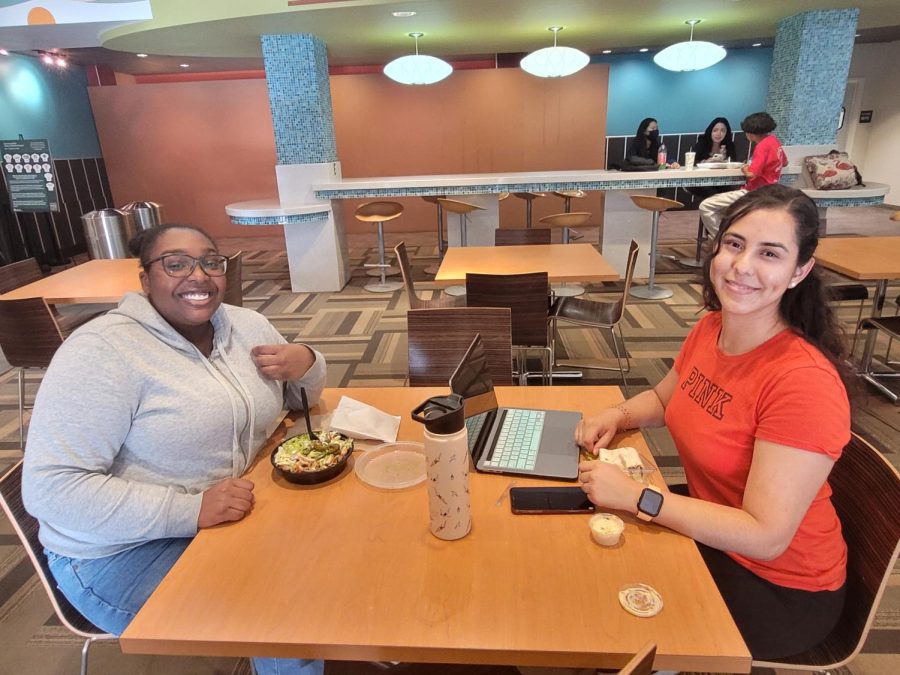
Fifth-year Kinesiology major Irene Salazar-Onate also does not feel her best when she eats a minimal amount of food. She said having her largest meal at the end of the day usually leaves her feeling poorly.
“I’ll usually have a quick shake in the morning and then I’ll maybe get a snack or two around lunchtime,” Salazar-Onate said. “I won’t eat my regular meal until I’m home eating dinner.”
Third-year computer science major Evan Cammack, who said that he studies on campus to avoid being distracted at home, added that he avoids eating during this time as well but when he does eat, it is not the healthiest option.
“‘l probably go out to eat more,” Cammack said. “ I get some fast food or something like that. I probably shouldn’t.”
Gazzaniga-Moloo does not recommend cutting foods out of diets, adding that students who place a rule upon themselves during a stressful time only create additional stress.
“When we don’t get enough calories coming in, then it makes it harder for us to concentrate,” Gazzaniga-Moloo said. “It can impact energy level, and contribute to fatigue. Certainly, those factors can impact study and information retention.”
Aside from maintaining a proper diet, Gazzaniga-Moloo also said that students should drink enough fluids and get at least 30 minutes of physical activity per day.
The story continues below the image.
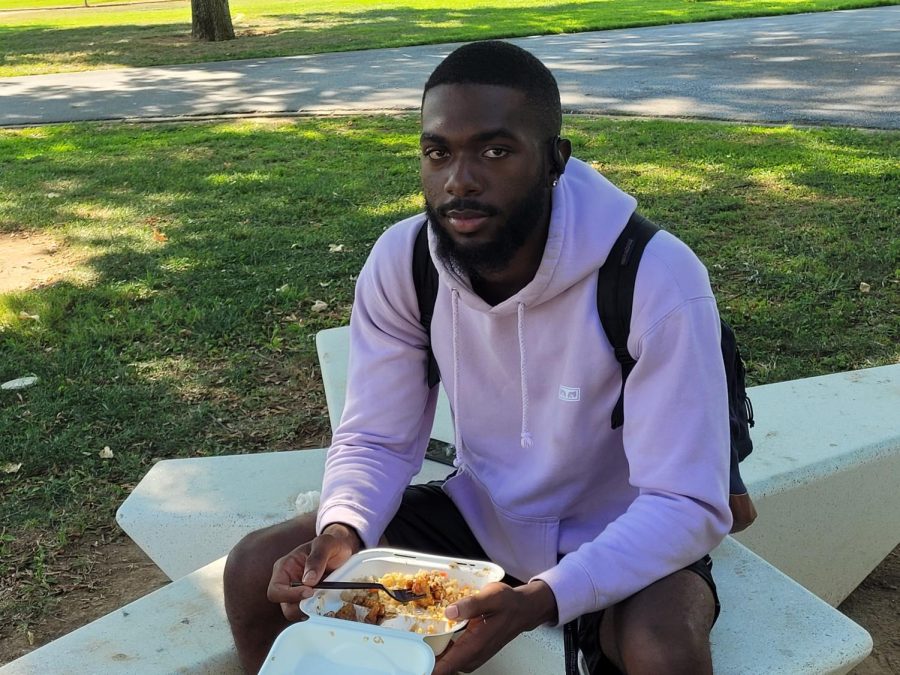
Midterms and studying, in general, can be stress-inducing but according to Gazzaniga-Moloo, if you practice mindful eating practices, it will only serve to benefit you in the long term.
For fourth-year journalism major Adrine Sermons, who said that he is calm during midterms, maintaining a balanced diet is important.
“You are what you eat,” Sermons said. “Staying balanced with my diet is key to staying emotionally intact.”




















































































































